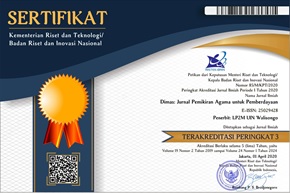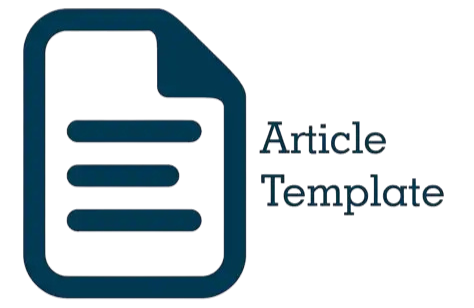Kiai as the Activator for Accelerating the Implementation of Child-Friendly Pesantren Based on the Local Wisdom
DOI:
https://doi.org/10.21580/dms.2022.222.13677Keywords:
local wisdom, pesantren, child-friendlyAbstract
This service is done to accelerate the implementation of child-friendly Islamic boarding schools in Tegal Regency which has come to the piloting stage or as prospective models. The service method is Participatory Action Research (PAR) whose process aims at learning in overcoming problems and meeting the practical needs of the pesantren by identifying problems, evaluating and exploring potential in accelerating the implementation of child-friendly pesantren. The output of the community service is that the Kiai and the management of the pesantren understand the laws and regulations regarding child protection and various types of child abuse that must be avoided, propose a Regent's Regulation as a follow-up to the Regional Regulation on Facilitation of Pesantren Development, strengthen the governance of pesantren for the creation of child-friendly pesantren, cooperate with various related parties for socialization and counseling related to child-friendly pesantren, and design a pesantren curriculum with standard student behavior.
Downloads
References
Alwi, S. (2020). Mewujudkan Pesantren Ramah Anak Melalui Program Care (Caring, Respect and Educate). Jurnal Saree, 2(1), 11–21. https://ejurnal.iainlhokseumawe.ac.id/index.php/saree/article/view/684
Denzin, N. K., & Lincoln, Y. S. (2009). Handbook of Qualitative Research. Pustaka Pelajar.
Fanani, M., Sholihan, & Karnadi. (2014). Transformasi Paradigma dan Implikasinya pada Desain Kurikulum Sains (Studi atas UIN Syarif Hidayatullah, UIN Sunan Kalijaga, dan UIN Malik Ibrahim). LP2M IAIN Walisongo.
George Ritzer, D. J. G. (2008). Teori Sosiologi Modern. Kencana.
Helmiyah, Khodijah, N., & Suryana, E. (2022). Konsep Pola Pendidikan Muallimin yang Tertuang pada Undang-Undang RI Nomor 18 Tahun 2019. Jurnal Ilmiah Ilmu Pendidikan, 5(7), 2108–2111. https://doi.org/10.54371/jiip.v5i7.68
Hidayat, D. M. (2021). Pedoman Pesantren Ramah Anak. Direktorat Pendidikan Diniyah dan Pondok Pesantren.
Jawardi, J. (2016). Strategi Pengembangan Budaya Hukum. Jurnal Penelitian Hukum De Jure, 16(1), 77–93. https://doi.org/10.30641/dejure.2016.V16.77-93
Lestari, A. O., & Hisbullah. (2020). Perlindungan Anak di Pesantren al-Ikhlas Menurut Undang-Undang Nomor 35 Tahun 2014. Siyasatuna, 1(3), 542–550. https://journal.uin-alauddin.ac.id/index.php/siyasatuna/article/view/19532
Mauna, B. (2001). Hukum Internasional (Pengertian Peranan dan Fungsi Dalam Era Dinamika Global) (Cet. III). Alumni.
Moesa, A. M. (2007). Nasionalisme Kiai: Konstruksi Sosial Berbasis Agama. LKiS.
Muslim, I. (2020). Peran Kyai dalam Mewujudkan Pesantren Ramah Anak (Madinatul Athfal) di Pondok Pesantren Darussa’adah Kebumen. IAINU.
Patepa, T. I. F. D. (2020). Perlindungan Khusus Bagi Anak Menurut Undang-Undang Nomor 35 Tahun 2014 Tentang Perubahan Atas Undang-Undang Nomor 23 Tahun 2002 Tentang Perlindungan Anak. LEX ET SOCIETATIS, 8(4), 93–103. https://doi.org/10.35796/les.v8i4.30914
Peraturan Presiden No. 82 tentang Pendanaan Penyelenggaraan Pesantren, (2021).
Priyono, B. H. (2008). Anthony Giddens: Suatu Pengantar. Kepustakaan Populer Gramedia.
Purba, I. P. (2017). Penguatan budaya hukum masyarakat untuk menghasilkan kewarganegaraan transformatif. Jurnal Civics: Media Kajian Kewarganegaraan, 14(2), 146–153. https://doi.org/10.21831/civics.v14i2.16050
Puspaningrum, D., & Kusmiati, A. (2018). Intervensi Komunitas: Mewujudkan Perubahan Sosial Lembaga Masyarakat Desa Hutan Konservasi (LMDHK) “Wono Mulyo”Menuju Kemandirian Lembaga. Pembangunan Pertanian Dan Peran Pendidikan Tinggi Agribisnis: Peluang Dan Tantangan Di Era Industri 4.0, 550–559. https://jurnal.unej.ac.id/index.php/prosiding/article/view/10658
Rachman, B. M. (2001). Islam Pluralis: Wacana Kesetaraan kaum Beriman. Paramadina.
Rahadi. (2004). Belajar Bersama Masyarakat. Susdec, LPTP.
Siswanto, S. (2016). Desain mutu pendidikan pesantren. KARSA: Jurnal Sosial Dan Budaya Keislaman, 23(2), 259–275. https://doi.org/10.19105/karsa.v23i2.726
Tandon, R. (1993). Evaluasi dan Riset Partisipatoris: Berbagai Konsep dan Persoalan Pokok. In W. Fernandes & R. Tandon (Eds.), & F. B. T. Wardaya (Trans.), Riset Partisipatoris Riset Pembebasan. PT Gramedia Pustaka Utama.
Trimaya, A. (2015). Pengaturan Perlindungan Khusus Bagi Anak Korban Kekerasan Dalam Undang-Undang Nomor 35 Tahun 2014 Tentang Perubahan Atas Undang-Undang Nomor 23 Tahun 2002 Tentang Perlindungan Anak. Legislasi Indonesia, 12(3). https://doi.org/10.54629/jli.v12i3.407
Wadi, A., & Mudzakkir, M. (2013). Strukturasi Perubahan Pendidikan Pesantren Di Madura (Fenomena Perubahan Pendidikan Pesantren Darussalam Al-Faisholiyah Di Sampang Madura). Paradigma, 1(3). https://ejournal.unesa.ac.id/index.php/paradigma/article/view/4111
War’i, M. (2019). Sosio-Religius Pesantren: Aktualisasi Nilai-Nilai Agama Dalam Ruang Sosial Kemasyarakatan di Lombok Timur. Fikri : Jurnal Kajian Agama, Sosial Dan Budaya, 4(1), 1–14. https://doi.org/10.25217/jf.v4i1.470
Wilson, S., Hean, S., Abebe, T., & Heaslip, V. (2020). Children’s experiences with Child Protection Services: A synthesis of qualitative evidence. Children and Youth Services Review, 113, 104974. https://doi.org/10.1016/j.childyouth.2020.104974
Zafar, N., Naeem, M., & Zehra, A. (2021). Professional team response to violence against children: From experts to teamwork. Child Abuse & Neglect, 119, 104777. https://doi.org/10.1016/j.chiabu.2020.104777
Downloads
Published
Issue
Section
License
Copyright
The copyright of the received article shall be assigned to the journal as the publisher of the journal. The intended copyright includes the right to publish the article in various forms (including reprints). The journal maintains the publishing rights to the published articles. Therefore, the author must submit a statement of the Copyright Transfer Agreement.*)
Licensing

This work is licensed under a Creative Commons Attribution-ShareAlike 4.0 International License.
In line with the license, authors are allowed to share and adapt the material. In addition, the material must be given appropriate credit, provided with a link to the license, and indicated if changes were made. If authors remix, transform or build upon the material, authors must distribute their contributions under the same license as the original.
_______
*) Authors whose articles are accepted for publication will receive confirmation via email and send a Copyright Transfer Agreement.









